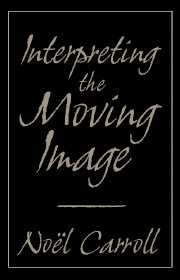Book contents
- Frontmatter
- Contents
- Foreword: Through Carroll's Looking Glass of Criticism
- Introduction
- 1 The Cabinet of Dr. Kracauer
- 2 Entr'acte, Paris and Dada
- 3 The Gold Rush
- 4 Keaton: Film Acting as Action
- 5 Buster Keaton, The General, and Visible Intelligibility
- 6 For God and Country
- 7 Lang, Pabst, and Sound
- 8 Notes on Dreyer's Vampyr
- 9 King Kong: Ape and Essence
- 10 Becky Sharp Takes Over
- 11 Interpreting Citizen Kane
- 12 The Moral Ecology of Melodrama: The Family Plot and Magnificent Obsession
- 13 Mind, Medium, and Metaphor in Harry Smith's Heaven and Earth Magic
- 14 Welles and Kafka
- 15 Nothing But a Man and The Cool World
- 16 Identity and Difference: From Ritual Symbolism to Condensation in Anger's Inauguration of the Pleasure Dome
- 17 Text of Light
- 18 Joan Jonas: Making the Image Visible
- 19 Introduction to Journeys from Berlin/1971
- 20 The Future of Allusion: Hollywood in the Seventies (and Beyond)
- 21 Back to Basics
- 22 Amy Taubin's Bag
- 23 Herzog, Presence, and Paradox
- 24 Film in the Age of Postmodernism
- Notes
- Index
14 - Welles and Kafka
Published online by Cambridge University Press: 05 June 2012
- Frontmatter
- Contents
- Foreword: Through Carroll's Looking Glass of Criticism
- Introduction
- 1 The Cabinet of Dr. Kracauer
- 2 Entr'acte, Paris and Dada
- 3 The Gold Rush
- 4 Keaton: Film Acting as Action
- 5 Buster Keaton, The General, and Visible Intelligibility
- 6 For God and Country
- 7 Lang, Pabst, and Sound
- 8 Notes on Dreyer's Vampyr
- 9 King Kong: Ape and Essence
- 10 Becky Sharp Takes Over
- 11 Interpreting Citizen Kane
- 12 The Moral Ecology of Melodrama: The Family Plot and Magnificent Obsession
- 13 Mind, Medium, and Metaphor in Harry Smith's Heaven and Earth Magic
- 14 Welles and Kafka
- 15 Nothing But a Man and The Cool World
- 16 Identity and Difference: From Ritual Symbolism to Condensation in Anger's Inauguration of the Pleasure Dome
- 17 Text of Light
- 18 Joan Jonas: Making the Image Visible
- 19 Introduction to Journeys from Berlin/1971
- 20 The Future of Allusion: Hollywood in the Seventies (and Beyond)
- 21 Back to Basics
- 22 Amy Taubin's Bag
- 23 Herzog, Presence, and Paradox
- 24 Film in the Age of Postmodernism
- Notes
- Index
Summary
Films adapted from important novels almost always suffer unfavorable comparison with their literary sources. This is the line often adopted when discussing Orson Welles' 1962 adaptation of Kafka's The Trial, However, it seems to me that Welles' film is, in fact, a brilliant adaptation – a point that I will now try to elucidate especially in terms of the ways in which Welles treats those aspects of Kafka that revolt against the processes of mystification fostered by mass, modern bureaucracy.
Welles is a director noted for his manipulation of cinematic space. Hence, a likely first step in analyzing Welles' film is to examine Kafka's use of space in order to compare it with Welles' organization of film space.
Space, in terms of geography, constitutes an explicit element of at least one important plot motif in Kafka's The Trial. This motif involves a related continuum of events including K.'s being lost or K.'s being confused or disoriented geographically. For example, K. is literally lost when he enters the law court offices for his first interrogation. He adopts the ruse of “the joiner Lanz” in order to find the Examining Magistrate, but to no avail. In addition, on K.'s second trip to the law court, he is unable to find the way out of the building. Here, Kafka spends a third of a chapter on the matter of K.'s confusion, and on the sensation of sickness that that confusion engenders.
- Type
- Chapter
- Information
- Interpreting the Moving Image , pp. 191 - 202Publisher: Cambridge University PressPrint publication year: 1998



